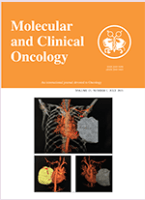
Molecular and Clinical Oncology
Scope & Guideline
Exploring new frontiers in molecular and clinical oncology.
Introduction
Aims and Scopes
- Clinical Oncology:
Focuses on the clinical aspects of cancer treatment, including chemotherapy, radiotherapy, and surgical interventions, providing insights into patient outcomes and treatment efficacy. - Molecular Mechanisms of Cancer:
Explores the underlying molecular and genetic factors that contribute to cancer development and progression, facilitating a deeper understanding of tumor biology. - Translational Research:
Encourages research that bridges laboratory findings with clinical applications, aiming to translate discoveries into effective therapeutic strategies for cancer patients. - Case Reports and Clinical Studies:
Includes detailed case reports and observational studies that highlight unique patient presentations, treatment responses, and clinical challenges, enriching the knowledge base within oncological practice. - Emerging Therapies and Biomarkers:
Investigates novel therapeutic agents, treatment regimens, and biomarkers that may improve cancer diagnosis and treatment, paving the way for personalized medicine.
Trending and Emerging
- Immunotherapy and Immune Checkpoint Inhibitors:
A growing body of research is focused on the development and efficacy of immunotherapy, particularly immune checkpoint inhibitors, which represent a significant advancement in cancer treatment. - Precision Medicine and Genomics:
Research exploring the role of genetic and molecular profiling in tailoring cancer therapies to individual patients is increasingly prominent, emphasizing the importance of personalized treatment strategies. - Liquid Biopsies and Biomarkers:
The use of liquid biopsies for cancer detection and monitoring, along with the identification of novel biomarkers, is gaining traction as a less invasive alternative to traditional tissue biopsies. - Combination Therapies:
Studies examining the effectiveness of combination therapies, integrating multiple treatment modalities such as chemotherapy, immunotherapy, and targeted therapies, are on the rise, reflecting a comprehensive approach to cancer management. - Neuro-oncology and CNS Tumors:
There is an increasing focus on the challenges and treatment strategies for central nervous system tumors, highlighting the unique considerations in neuro-oncology.
Declining or Waning
- Basic Science Research:
There has been a noticeable decrease in purely laboratory-based studies that do not translate directly into clinical applications, as the journal increasingly prioritizes translational and clinical research. - Traditional Chemotherapy Studies:
Research focusing solely on traditional chemotherapy regimens, without consideration of personalized or targeted approaches, has become less frequent, reflecting a shift towards exploring novel therapies. - Epidemiological Studies:
While still relevant, the volume of epidemiological studies focusing on cancer incidence and prevalence has diminished, possibly due to the journal's emphasis on more direct clinical implications and therapeutic innovations.
Similar Journals
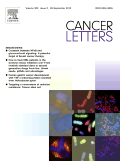
CANCER LETTERS
Pioneering insights for a cancer-free future.Cancer Letters, a leading journal published by Elsevier Ireland Ltd, is dedicated to advancing the field of oncology and cancer research. With a rich history that spans from 1975 to 2024, this esteemed journal has established itself as a vital resource within the scientific community, holding a prestigious Q1 status in both Cancer Research and Oncology categories as of 2023. With an impressive ranking of #26/404 in Medicine _ Oncology and #19/230 in Biochemistry, Genetics and Molecular Biology _ Cancer Research, Cancer Letters sits in the top percentiles of its field, reflecting its high impact and relevance. Although it does not currently offer open access, the journal remains committed to disseminating paramount research findings, innovative methodologies, and critical reviews that inform and enhance ongoing studies in cancer therapeutics and patient care. Researchers, professionals, and students alike will find invaluable insights into the latest developments and discoveries in cancer research through the pages of Cancer Letters.

Cancer Management and Research
Advancing oncology through innovative research.Cancer Management and Research, published by DOVE MEDICAL PRESS LTD, is a leading open-access journal dedicated to advancing the field of oncology. Since its inception in 2009, this journal has established itself as a vital resource for researchers, clinicians, and healthcare professionals focused on cancer treatment and management. With its robust impact factor and impressive Scopus ranking in the 77th percentile of oncology medicine, it provides a prominent platform for sharing high-quality research. The journal covers a wide range of topics within cancer management, including innovative therapeutic strategies, clinical trials, patient care, and health policy, ensuring a comprehensive approach to current challenges in the field. Operating from New Zealand, it invites contributions that can shape the future of oncology and improve patient outcomes globally, making it an essential addition to the libraries of those engaged in cancer research and practice.
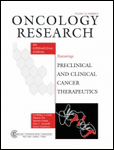
ONCOLOGY RESEARCH
Connecting Ideas, Advancing OncologyONCOLOGY RESEARCH, published by TECH SCIENCE PRESS, is a vital academic journal dedicated to the rapidly evolving field of oncology. With its ISSN 0965-0407 and E-ISSN 1555-3906, the journal serves as a key resource for researchers, clinicians, and academicians committed to advancing cancer research and treatment strategies. Operating without an Open Access model, ONCOLOGY RESEARCH provides high-quality, peer-reviewed articles that cover diverse topics within cancer research, medicine, and oncology, with its 2023 Scopus ranking placing it in the Q3 quartile. The journal's commitment to facilitating rigorous scientific discourse is evident in its historical breadth, with a publishing history dating back to 1992. ONCOLOGY RESEARCH is not only significant for the academic community but also plays a critical role in fostering new insights and approaches in the fight against cancer, making it a must-read for those involved in this critical area of study.

Oncology Reviews
Empowering Oncology Insights for a Healthier TomorrowOncology Reviews, founded in 2007 and published by FRONTIERS MEDIA SA, is a leading open-access journal dedicated to advancing knowledge in the field of oncology and cancer research. With an Impact Factor reflecting its robust engagement in scholarly discourse, this journal maintains a prestigious standing, earning a Q2 ranking in Oncology and a Q3 ranking in Cancer Research as of 2023. Notably, it is indexed in Scopus, where it ranks #118 in Oncology and #98 in Cancer Research, highlighting its global reach and significance. The journal's open-access policy, in effect since 2012, ensures that high-quality research is accessible to all, fostering collaboration and wellness improvements worldwide. This commitment to accessibility and dissemination of pivotal research makes Oncology Reviews an essential resource for researchers, healthcare professionals, and students eager to contribute to and stay abreast of the latest innovations in cancer treatment and research.
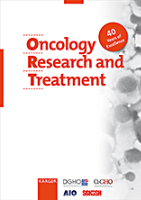
Oncology Research and Treatment
Uniting researchers to combat cancer effectively.Oncology Research and Treatment, published by KARGER, is a highly regarded academic journal dedicated to advancing the field of oncology through rigorous research and clinical insights. With a history spanning from 1978 to 1997 and continuing from 2013 to 2024, this journal provides a vital platform for researchers and professionals in cancer research, hematology, and related disciplines. Though currently listed in the Q3 tier of 2023 for Cancer Research, Hematology, and Oncology, its growing readership and open access policy enhance its visibility and impact within the scientific community. Based in Switzerland, the journal features diverse access options, reflecting the global importance of oncology research. With a focus on innovative treatments and the latest methodologies, Oncology Research and Treatment plays a crucial role in fostering collaboration and dialogue among researchers, professionals, and students alike, helping to shape the future of cancer care and management.

BRITISH JOURNAL OF CANCER
Shaping the Future of Oncology Through Quality Scholarship.The British Journal of Cancer, published by SpringerNature, stands as a preeminent resource in the fields of Cancer Research and Oncology, with a distinguished history of publication dating back to 1947. With its Q1 rank in both categories for 2023, this journal is among the top-tier publications, offering cutting-edge research and insights into the biology, etiology, and treatment of cancer. The journal’s rigorous peer-review process ensures that readers are presented with high-quality studies that contribute to the advancement of cancer knowledge and clinical practice. Operating from the United Kingdom, it has garnered a notable impact factor and ranks impressively within Scopus, making it an essential publication for researchers, healthcare professionals, and students who are dedicated to understanding cancer's complexities. Access to the journal's articles is available in traditional formats, providing a versatile platform for disseminating pivotal research. As we move towards a future where cancer treatment and prevention remain crucial, the British Journal of Cancer continues to play a vital role in shaping the dialogue and discoveries within the oncology community.
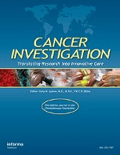
CANCER INVESTIGATION
Advancing cancer research, one investigation at a time.CANCER INVESTIGATION is a distinguished peer-reviewed journal published by Taylor & Francis Inc, dedicated to the advancing field of cancer research and oncology. With an ISSN of 0735-7907 and E-ISSN of 1532-4192, this journal has been a pivotal resource for professionals and researchers since its inception in 1983, continually contributing to the evolving landscape of cancer investigation until its convergence in 2024. CANCER INVESTIGATION boasts noteworthy rankings in 2023, including Q3 in Cancer Research and Q2 in Medicine (miscellaneous), highlighting its relevance and impact in these critical areas. The journal's commitment to disseminating innovative research and comprehensive reviews makes it an essential platform for those engaged in cancer studies and related disciplines. While currently not available as an open-access publication, CANCER INVESTIGATION remains an invaluable tool for understanding the complexities of cancer, offering insights that drive scientific advancements and improve patient outcomes.

Oncologie
Pioneering insights in the fight against cancer.Oncologie is a distinguished academic journal published by WALTER DE GRUYTER GMBH, focusing on the dynamic and vital field of oncology. Established in 1999 and continuously published until 2024, this journal provides a platform for high-quality research and advancements in cancer treatment, prevention, and diagnosis. With an ISSN of 1292-3818 and an E-ISSN of 1765-2839, it is indexed in various databases, contributing to its growing visibility. Although categorized in the Q3 quartile for oncology research as of 2023, Oncologie offers essential insights and fosters scholarly dialogue among researchers, professionals, and students interested in oncology. Its unique contributions aim to bridge the gap between theoretical frameworks and clinical applications, making it a valuable resource for those seeking to advance their knowledge and expertise in cancer research.
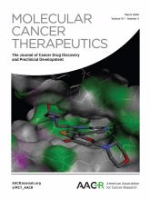
MOLECULAR CANCER THERAPEUTICS
Empowering breakthroughs in cancer research and treatment.MOLECULAR CANCER THERAPEUTICS, published by the American Association for Cancer Research, is a premier journal dedicated to advancing the field of cancer research and therapy since 2001. With a notable impact factor reflecting its high-quality content, this journal stands out in the Q1 category for both Cancer Research and Oncology as of 2023. Researchers, clinicians, and students interested in innovative treatment strategies and molecular mechanisms can find valuable insights within its pages, bolstered by a rigorous peer-review process and a global perspective on cancer therapeutic developments. Although the journal operates under a subscription model, it provides comprehensive access to cutting-edge studies and reviews that drive forward the understanding of cancer biology and treatment modalities. The journal's impressive Scopus rankings further validate its influence within both oncology and the broader cancer research community, making it an indispensable resource for anyone committed to combating cancer through science.
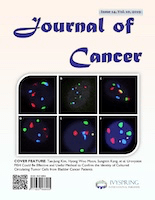
Journal of Cancer
Empowering the global fight against cancer.Journal of Cancer is a premier, peer-reviewed academic journal published by IVYSPRING INTERNATIONAL PUBLISHING that focuses on advancing the field of oncology. With an impact factor reflecting its significant contributions, this journal ranks in the 80th percentile of medical journals pertaining to oncology, positioning it at #79 out of 404 in Scopus. Since its inception in 2010, the journal has embraced an Open Access model, ensuring that groundbreaking research reaches a global audience without barriers. Based in Australia, the journal addresses a wide array of topics within cancer research, catering to researchers, healthcare professionals, and students committed to enhancing their understanding of the complexities of cancer. Amidst evolving challenges in oncology, the Journal of Cancer serves as a vital platform for disseminating innovative findings, fostering collaboration, and promoting informed decisions that can lead to improved cancer outcomes worldwide.